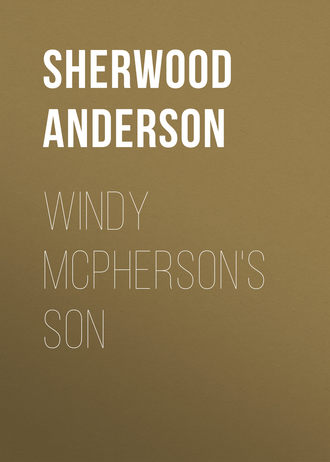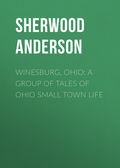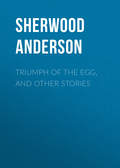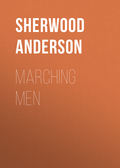
Шервуд Андерсон
Windy McPherson's Son
He got to his feet and stood beside his mother. He had no qualms about passing himself off as one of the lambs safely within the fold. His mind was bent upon quieting Jim Williams’ prayers and avoiding the attention of the people.
The minister began calling on the standing people to testify of their salvation. From various parts of the church the people spoke out, some loudly and boldly and with a ring of confidence in their voices, some tremblingly and hesitatingly. One woman wept loudly shouting between the paroxysms of sobbing that seized her, “The weight of my sins is heavy on my soul.” Girls and young men when called on by the minister responded with shamed, hesitating voices asking that a verse of some hymn be sung, or quoting a line of scripture.
At the back of the church the evangelist with one of the deacons and two or three women had gathered about a small, black-haired woman, the wife of a baker to whom Sam delivered papers. They were urging her to rise and get within the fold, and Sam turned and watched her curiously, his sympathy going out to her. With all his heart he hoped that she would continue doggedly shaking her head.
Suddenly the irrepressible Jim Williams broke forth again. A quiver ran over Sam’s body and the blood rose to his cheeks. “Here is another sinner saved,” shouted Jim, pointing to the standing boy. “Count this boy, Sam McPherson, in the fold among the lambs.”
On the platform the brown-bearded minister stood upon a chair and looked over the heads of the people. An ingratiating smile played about his lips. “Let us hear from the young man, Sam McPherson,” he said, raising his hand for silence, and, then, encouragingly, “Sam, what have you to say for the Lord?”
Become the centre for the attention of the people in the church Sam was terror-stricken. The rage against Jim Williams was forgotten in the spasm of fear that seized him. He looked over his shoulder to the door at the back of the church and thought longingly of the quiet street outside. He hesitated, stammered, grew more red and uncertain, and finally burst out: “The Lord,” he said, and then looked about hopelessly, “the Lord maketh me to lie out in green pastures.”
In the seats behind him a titter arose. A young woman sitting among the singers in the choir put her handkerchief to her face and throwing back her head rocked back and forth. A man near the door guffawed loudly and went hurriedly out. All over the church people began laughing.
Sam turned his eyes upon his mother. She was staring straight ahead of her, and her face was red. “I’m going out of this place and I’m never coming back again,” he whispered, and, stepping into the aisle, walked boldly toward the door. He had made up his mind that if the evangelist tried to stop him he would fight. At his back he felt the rows of people looking at him and smiling. The laughter continued.
In the street he hurried along consumed with indignation. “I’ll never go into any church again,” he swore, shaking his fist in the air. The public avowals he had heard in the church seemed to him cheap and unworthy. He wondered why his mother stayed in there. With a sweep of his arm he dismissed all the people in the church. “It is a place to make public asses of the people,” he thought.
Sam McPherson wandered through Main Street, dreading to meet Valmore and John Telfer. Finding the chairs back of the stove in Wildman’s grocery deserted, he hurried past the grocer and hid in a corner. Tears of wrath stood in his eyes. He had been made a fool of. He imagined the scene that would go on when he came upon the street with the papers the next morning. Freedom Smith would be there sitting in the old worn buggy and roaring so that all the street would listen and laugh. “Going to lie out in any green pastures to-night, Sam?” he would shout. “Ain’t you afraid you’ll take cold?” By Geiger’s drug store would stand Valmore and Telfer, eager to join in the fun at his expense. Telfer would pound on the side of the building with his cane and roar with laughter. Valmore would make a trumpet of his hands and shout after the fleeing boy. “Do you sleep out alone in them green pastures?” Freedom Smith would roar again.
Sam got up and went out of the grocery. As he hurried along, blind with wrath, he felt he would like a stand-up fight with some one. And, then, hurrying and avoiding the people, he merged with the crowd on the street and became a witness to the strange thing that happened that night in Caxton.
In Main Street hushed people stood about in groups talking. The air was heavy with excitement. Solitary figures went from group to group whispering hoarsely. Mike McCarthy, the man who had denied God and who had won a place for himself in the affection of the newsboy, had assaulted a man with a pocket knife and had left him bleeding and wounded beside a country road. Something big and sensational had happened in the life of the town.
Mike McCarthy and Sam were friends. For years the man had idled upon the streets of the town, loitering about, boasting and talking. He had sat for hours in a chair under a tree before the New Leland House, reading books, doing tricks with cards, engaging in long discussions with John Telfer or any who would stand up to him.
Mike McCarthy got into trouble in a fight over a woman. A young farmer living at the edge of Caxton had come home from the fields to find his wife in the bold Irishman’s arms and the two men had gone out of the house together to fight in the road. The woman, weeping in the house, followed to ask forgiveness of her husband. Running in the gathering darkness along the road she had found him cut and bleeding terribly, lying in a ditch under a hedge. On down the road she ran and appeared at the door of a neighbour, screaming and calling for help.
The story of the fight in the road got to Caxton just as Sam came out of the corner, back of the stove in Wildman’s and appeared on the street. Men ran from store to store and from group to group along the street saying that the young farmer had died and that murder had been done. On a street corner Windy McPherson harangued the crowd declaring that the men of Caxton should arise in the defence of their homes and string the murderer to a lamp post. Hop Higgins, driving a horse from Culvert’s livery, appeared on Main Street. “He will be at the McCarthy farm,” he shouted. When several men, coming out of Geiger’s drug store, stopped the marshal’s horse, saying, “You will have trouble out there; you had better take help,” the little red-faced marshal with the crippled leg laughed. “What trouble?” he asked—“To get Mike McCarthy? I shall ask him to come and he will come. The rest of that lot won’t cut any figure. Mike can wrap the entire McCarthy family around his finger.”
There were six of the McCarthy men, all, except Mike, silent, sullen men who only talked when they were in liquor. Mike furnished the town’s social touch with the family. It was a strange family to live there in that fat, corn-growing country, a family with something savage and primitive about it, one that belonged among western mining camps or among the half savage dwellers in deep alleys in cities, and the fact that it lived on a corn farm in Iowa was, in the words of John Telfer, “something monstrous in Nature.”
The McCarthy farm, lying some four miles east of Caxton, had once contained a thousand acres of good corn-growing land. Lem McCarthy, the father of the family, had inherited it from a brother, a gold miner, a forty-niner, a sport owning fast horses, who planned to breed race horses on the Iowa land. Lem had come out of the back streets of an eastern city, bringing his brood of tall, silent, savage boys to live upon the land and, like the forty-niner, to be a sport. Thinking the wealth that had come to him vast beyond spending, he had plunged into horse racing and gambling. When, within two years, five hundred acres of the farm had to be sold to pay gambling debts, and the wide acres lay covered with weeds, Lem became alarmed, and settled down to hard work, the boys working all day in the field and at long intervals coming into town at night to get into trouble. Having no mother or sister, and knowing that no Caxton woman could be hired to go upon the place, they did their own housework; and on rainy days sat about the old farmhouse playing cards and fighting. On other days they would stand around the bar in Art Sherman’s saloon in Piety Hollow drinking until they had lost their savage silence and had become loud and quarrelsome, going from there upon the streets to seek trouble. Once, going into Hayner’s restaurant, they took stacks of plates from shelves back of the counter and, standing in the doorway, threw them at people passing in the street, the crash of the breaking crockery accompanying their roaring laughter. When they had driven the people to cover they got upon their horses and with wild shouts raced up and down Main Street between the rows of tied horses until Hop Higgins, the town marshal, appeared, when they rode off into the country awakening the farmers along the darkened road as they fled, shouting and singing, toward home.
When the McCarthy boys got into trouble in Caxton, old Lem McCarthy drove into town and got them out of it, paying for the damage done and going about declaring the boys meant no harm. When told to keep them out of town he shook his head and said he would try.
Mike McCarthy did not ride swearing and singing with the five brothers along the dark road. He did not work all day in the hot corn fields. He was the family gentleman, and, wearing good clothes, strolled instead upon the street or loitered in the shade before the New Leland House. Mike had been educated. For some years he had attended a college in Indiana from which he was expelled for an affair with a woman. After his return from college he stayed in Caxton, living at the hotel and making a pretence of studying law in the office of old Judge Reynolds. He paid slight attention to the study of law, but with infinite patience had so trained his hands that he became wonderfully dexterous with coins and cards, plucking them out of the air and making them appear in the shoes, the hats, and even in the mouths, of bystanders. During the day he walked the streets looking at the girl clerks in the stores, or stood upon the station platform waving his hand to women passengers on passing trains. He told John Telfer that the flattery of women was a lost art that he intended to restore. Mike McCarthy carried in his pockets books which he read sitting in a chair before the hotel or on the stones before store windows. When on Saturdays the streets were filled with people, he stood on the corners giving gratuitous performances of his magical art with cards and coins, and eyeing country girls in the crowd. Once, a woman, the town stationer’s wife, shouted at him, calling him a lazy lout, whereupon he threw a coin in the air, and when it did not come down rushed toward her shouting, “She has it in her stocking.” When the stationer’s wife ran into her shop and banged the door the crowd laughed and shouted with delight.
Telfer had a liking for the tall, grey-eyed, loitering McCarthy and sometimes sat with him discussing a novel or a poem; Sam in the background listened eagerly. Valmore did not care for the man, shaking his head and declaring that such a fellow could come to no good end.
The rest of the town agreed with Valmore, and McCarthy, knowing this, sunned himself in the town’s displeasure. For the sake of the public furor it brought down upon his head he proclaimed himself a socialist, an anarchist, an atheist, a pagan. Among all the McCarthy boys he alone cared greatly about women, and he made public and open declarations of his passion for them. Before the men gathered about the stove in Wildman’s grocery store he would stand whipping them into a frenzy by declaring for free love, and vowing that he would have the best of any woman who gave him the chance.
For this man the frugal, hard working newsboy had conceived a regard amounting to a passion. As he listened to McCarthy he got continuous delightful little thrills. “There is nothing he would not dare,” thought the boy. “He is the freest, the boldest, the bravest man in town.” When the young Irishman, seeing the admiration in his eyes, flung him a silver dollar saying, “That is for your fine brown eyes, my boy; it I had them I would have half the women in town after me,” Sam kept the dollar in his pocket and counted it a kind of treasure like the rose given a lover by his sweetheart.
It was past eleven o’clock when Hop Higgins returned to town with McCarthy, driving quietly along the street and through an alley at the back of the town hall. The crowd upon the street had broken up. Sam had gone from one to another of the muttering groups, his heart quaking with fear. Now he stood at the back of the mass of men gathered at the jail door. An oil lamp, burning at the top of the post above the door, threw dancing, flickering lights on the faces of the men before him. The thunder storm that had threatened had not come, but the unnatural warm wind continued and the sky overhead was inky black.
Through the alley, to the jail door, drove the town marshal, the young McCarthy sitting in the buggy beside him. A man rushed forward to hold the horse. McCarthy’s face was chalky white. He laughed and shouted, raising his hand toward the sky.
“I am Michael, son of God. I have cut a man with a knife so that his red blood ran upon the ground. I am the son of God and this filthy jail shall be my sanctuary. In there I shall talk aloud with my Father,” he roared hoarsely, shaking his fist at the crowd. “Sons of this cesspool of respectability, stay and hear! Send for your females and let them stand in the presence of a man!”
Taking the white, wild-eyed man by the arm Marshal Higgins led him into the jail, the clank of locks, the low murmur of the voice of Higgins and the wild laughter of McCarthy floating out to the group of silent men standing in the mud of the alley.
Sam McPherson ran past the group of men to the side of the jail and finding John Telfer and Valmore leaning silently against the wall of Tom Folger’s wagon shop slipped between them. Telfer put out his arm and laid it upon the boy’s shoulder. Hop Higgins, coming out of the jail, addressed the crowd. “Don’t answer if he talks,” he said; “he is as crazy as a loon.”
Sam moved closer to Telfer. The voice of the imprisoned man, loud, and filled with a startling boldness, rolled out of the jail. He began praying.
“Hear me, Father Almighty, who has permitted this town of Caxton to exist and has let me, Thy son, grow to manhood. I am Michael, Thy son. They have put me in this jail where rats run across the floor and they stand in the mud outside as I talk with Thee. Are you there, old Truepenny?”
A breath of cold air blew up the alley followed by a flaw of rain. The group under the flickering lamp by the jail entrance drew back against the walls of the building. Sam could see them dimly, pressing closely against the wall. The man in the jail laughed loudly.
“I have had a philosophy of life, O Father,” he shouted. “I have seen men and women here living year after year without children. I have seen them hoarding pennies and denying Thee new life on which to work Thy will. To these women I have gone secretly talking of carnal love. With them I have been gentle and kind; them I have flattered.”
A roaring laugh broke from the lips of the imprisoned man. “Are you there, oh dwellers in the cesspool of respectability?” he shouted. “Do you stand in the mud with cold feet listening? I have been with your wives. Eleven Caxton wives without babes have I been with and it has been fruitless. The twelfth woman I have just left, leaving her man in the road a bleeding sacrifice to thee. I shall call out the names of the eleven. I shall have revenge also upon the husbands of the women, some of whom wait with the others in the mud outside.”
He began calling off the names of Caxton wives. A shudder ran through the body of the boy, sensitised by the new chill in the air and by the excitement of the night. Among the men standing along the wall of the jail a murmur arose. Again they grouped themselves under the flickering light by the jail door, disregarding the rain. Valmore, stumbling out of the darkness beside Sam, stood before Telfer. “The boy should be going home,” he said; “this isn’t fit for him to hear.”
Telfer laughed and drew Sam closer to him. “He has heard enough lies in this town,” he said. “Truth won’t hurt him. I would not go myself, nor would you, and the boy shall not go. This McCarthy has a brain. Although he is half insane now he is trying to work something out. The boy and I will stay to hear.”
The voice from the jail continued calling out the names of Caxton wives. Voices in the group before the jail door began shouting: “This should be stopped. Let us tear down the jail.”
McCarthy laughed aloud. “They squirm, oh Father, they squirm; I have them in the pit and I torture them,” he cried.
An ugly feeling of satisfaction came over Sam. He had a sense of the fact that the names shouted from the jail would be repeated over and over through the town. One of the women whose names had been called out had stood with the evangelist at the back of the church trying to induce the wife of the baker to rise and be counted in the fold with the lambs.
The rain, falling on the shoulders of the men by the jail door, changed to hail, the air grew colder and the hailstones rattled on the roofs of buildings. Some of the men joined Telfer and Valmore, talking in low, excited voices. “And Mary McKane, too, the hypocrite,” Sam heard one of them say.
The voice inside the jail changed. Still praying, Mike McCarthy seemed also to be talking to the group in the darkness outside.
“I am sick of my life. I have sought leadership and have not found it. Oh Father! Send down to men a new Christ, one to get hold of us, a modern Christ with a pipe in his mouth who will swear and knock us about so that we vermin who pretend to be made in Thy image will understand. Let him go into churches and into courthouses, into cities, and into towns like this, shouting, ‘Be ashamed! Be ashamed of your cowardly concern over your snivelling souls!’ Let him tell us that never will our lives, so miserably lived, be repeated after our bodies lie rotting in the grave.”
A sob broke from his lips and a lump came into Sam’s throat.
“Oh Father! help us men of Caxton to understand that we have only this, our lives, this life so warm and hopeful and laughing in the sun, this life with its awkward boys full of strange possibilities, and its girls with their long legs and freckles on their noses, that are meant to carry life within themselves, new life, kicking and stirring, and waking them at night.”
The voice of the prayer broke. Wild sobs took the place of speech. “Father!” shouted the broken voice, “I have taken a life, a man that moved and talked and whistled in the sunshine on winter mornings; I have killed.”
The voice inside the jail became inaudible. Silence, broken by low sobs from the jail, fell on the little dark alley and the listening men began going silently away. The lump in Sam’s throat grew larger. Tears stood in his eyes. He went with Telfer and Valmore out of the alley and into the street, the two men walking in silence. The rain had ceased and a cold wind blew.
The boy felt that he had been shriven. His mind, his heart, even his tired body seemed strangely cleansed. He felt a new affection for Telfer and Valmore. When Telfer began talking he listened eagerly, thinking that at last he understood him and knew why men like Valmore, Wildman, Freedom Smith, and Telfer loved each other and went on being friends year after year in the face of difficulties and misunderstandings. He thought that he had got hold of the idea of brotherhood that John Telfer talked of so often and so eloquently. “Mike McCarthy is only a brother who has gone the dark road,” he thought and felt a glow of pride in the thought and in the apt expression of it in his mind.
John Telfer, forgetting the boy, talked soberly to Valmore, the two men stumbling along in the darkness intent upon their own thoughts.
“It is an odd thought,” said Telfer and his voice seemed far away and unnatural like the voice from the jail; “it is an odd thought that but for a quirk in the brain this Mike McCarthy might himself have been a kind of Christ with a pipe in his mouth.”
Valmore stumbled and half fell in the darkness at a street crossing. Telfer went on talking.
“The world will some day grope its way into some kind of an understanding of its extraordinary men. Now they suffer terribly. In success or in such failures as has come to this imaginative, strangely perverted Irishman their lot is pitiful. It is only the common, the plain, unthinking man who slides peacefully through this troubled world.”
At the house Jane McPherson sat waiting for her boy. She was thinking of the scene in the church and a hard light was in her eyes. Sam went past the sleeping room of his parents, where Windy McPherson snored peacefully, and up the stairway to his own room. He undressed and, putting out the light, knelt upon the floor. From the wild ravings of the man in the jail he had got hold of something. In the midst of the blasphemy of Mike McCarthy he had sensed a deep and abiding love of life. Where the church had failed the bold sensualist succeeded. Sam felt that he could have prayed in the presence of the entire town.
“Oh, Father!” he cried, sending up his voice in the silence of the little room, “make me stick to the thought that the right living of this, my life, is my duty to you.”
By the door below, while Valmore waited on the sidewalk, Telfer talked to Jane McPherson.
“I wanted Sam to hear,” he explained. “He needs a religion. All young men need a religion. I wanted him to hear how even a man like Mike McCarthy keeps instinctively trying to justify himself before God.”







